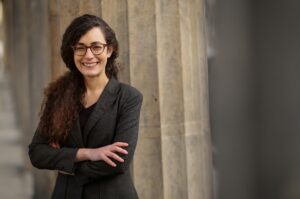Der shtumer meshiekh
Act I. A large gate outside the city walls of Illyria. Two guards enjoy the fact that the Jews are being expelled. The gates open and Jews come out, wearing yellow patches, and crying. A blind man repeatedly says these are signs of the Messiah coming. Eventually, Rokhl emerges. The daughter of Menachem Pnini, one of the city’s leaders, she persuades the crowd to make its way to the Land of Israel, not to scatter among various Christian nations. Her father is later sent out too. He has been tortured, and his tongue has been cut out. He is pleased to learn what his daughter achieved, and asks her to be his tongue. The exiled Jews, singing, make their way toward the Land of Israel.
Act II. A campground near the seashore, which is visible in the background. The Beggar goes from one tent opening to another, and taunts one of the exiles, calling her a whore. When Rokhl comes out, he moves on. Rokhl eyes the tent across from her, and when Hillel emerges from it, they start talking, and before long, confess their love for one another. But she says she can’t marry him, because while her father was being tortured, he had a vision that told him he wouldn’t die, but would gather the Jews to go to Zion. Once they make it there, she and her father will wander throughout the Diaspora and gather the Jews—“He will be Moses; I, his Aaron.” When Pnini comes out of the tent, Hillel tells him that he and Rokhl love each other, and offers to go wherever she and Pnini go—and never to get in the way of their mission. Pnini gives them his blessing, saying that the wedding will take place in the Land of Israel. Then a stir in the camp: Meshulem, who at the last minute chose to stay behind in Illyria, arrives on horseback to announce that King Philip died in a hunting accident, and his son and successor King Louis has rescinded the expulsion order. Most of the exiles immediately change their plans and want to return to Illyria. Rokhl, on her father’s behalf, tries in vain to talk them out of it. Pnini is anguished by this turn of events.
Act III. Still in the camp. Rokhl feels she let her father down, but Hillel tries to convince her that nothing would have persuaded the exiles to stay the course. He wants her to return to Illyria with him, but she feels that she’ll have to go to the Land of Israel if that’s still the plan, particularly if her father really is the Messiah. The king’s messengers arrive. The news is delivered by a Count, who is baffled by the cool reception it receives. He assures them that the King’s invitation is real, and that he will not only protect them, but financially support them for the first year after their return. He gives the official notice to Pnini, who to everyone’s shock throws it to the ground. The Count says he has fulfilled his mission, and returns to Illyria. While the Jews start berating Pnini for potentially getting them in trouble—or maybe forcing them not to return—Leah exclaims that he is the Messiah. Rokhl tells Hillel this is the “wonder” they need to keep the Jews from returning to Illyria, and reveals to everyone the vision her father had. But just as it seems to be working, Leah punctures Rokhl’s exhortations by turning to various others and calling each of them “Messiah.” Laughter erupts in the crowd. Pnini throws himself into the sea. The crowd is stunned, while Leah dances in a circle and cries, “Messiah! Messiah! Messiah!”

